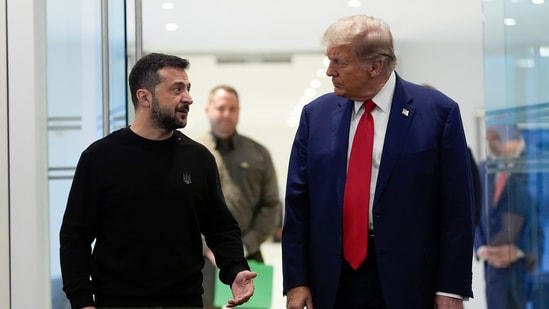U.S. President Donald Trump and Ukrainian President Volodymyr Zelenskyy have engaged in discussions aimed at initiating peace negotiations to end the ongoing conflict in Ukraine. This initiative follows President Trump’s recent conversation with Russian President Vladimir Putin, where both leaders agreed to commence immediate talks to resolve the war.
Trump-Putin Agreement
On February 12, 2025, President Trump announced that he had a “lengthy and highly productive phone call” with President Putin. During this conversation, both leaders concurred on the necessity to begin negotiations promptly to halt the hostilities in Ukraine. They also agreed to arrange reciprocal visits to each other’s countries as a gesture of goodwill and to further diplomatic relations.
Engagement with President Zelenskyy
Following his discussion with President Putin, President Trump reached out to President Zelenskyy to inform him of the proposed peace talks. President Zelenskyy expressed Ukraine’s desire for peace and emphasized the importance of halting Russian aggression with the support of the United States. He stated, “Together with the U.S., we are charting our next steps to stop Russian aggression and ensure a lasting, reliable peace.”
Upcoming Diplomatic Efforts
To advance the peace process, President Zelenskyy is scheduled to meet with U.S. Vice President J.D. Vance and Secretary of State Marco Rubio at the upcoming Munich Security Conference. These meetings aim to prepare for a potential direct encounter between Presidents Trump and Zelenskyy, where they can further discuss the framework for peace negotiations.
U.S. Policy Stance
U.S. Defense Secretary Pete Hegseth has indicated that the United States considers a return to Ukraine’s pre-2014 borders an unrealistic objective in the peace settlement. He emphasized that any attempt to regain all territory “will only prolong the war and cause more suffering.” Additionally, Secretary Hegseth stated that President Trump does not support NATO membership for Ukraine as part of the peace agreement and expects European nations to provide more financial and military assistance to Ukraine. The U.S. plans to focus on its own security priorities and the strategic challenge posed by China, with no intention of deploying American troops to Ukraine.
European Reactions
The proposed U.S.-Russia peace talks have elicited varied responses from European leaders. German Foreign Minister Annalena Baerbock and Spanish Foreign Minister José Manuel Albares have both asserted that “no decision on Ukraine can be made without Ukraine,” underscoring the necessity of including Ukraine in any negotiations. They advocate for a “just peace” that respects Ukraine’s sovereignty and territorial integrity. Other European officials have echoed these sentiments, emphasizing that Ukraine must have agency in the negotiation process and cautioning against any agreements that might compromise its territorial integrity.
The initiation of peace talks marks a pivotal moment in the effort to resolve the conflict in Ukraine. While the collaboration between the U.S. and Russia to facilitate negotiations is a positive step, the inclusion and active participation of Ukraine in these discussions are crucial to achieving a just and enduring peace. The international community will be closely monitoring the forthcoming diplomatic engagements, hoping for a resolution that upholds Ukraine’s sovereignty and contributes to regional stability.

